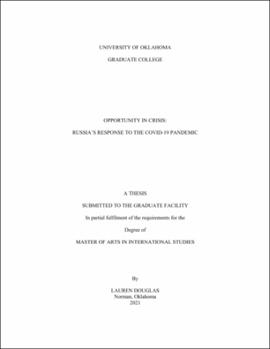| dc.description.abstract | Sweeping the globe in 2020, the Covid-19 pandemic has delivered one of the greatest shocks to the international system in recent history. Beyond presenting a health crisis, the pandemic has affected global trade and international cooperation, granting it the potential to widen cracks in the international system or accelerate trends in power transition. As a state that desires a shift in global distributions of power, Russia stands as a valuable subject of analysis in the context of the pandemic. How has Russia pursued its national interests through its foreign policy responses to the pandemic? Are Russia's actions formulated towards the pursuit of any particular goal, or simply a reaction to an unexpected crisis? By identifying Russia's major national interests and examining Russia's foreign policy responses to the pandemic, this paper finds that Russia’s international pandemic response was primarily designed to increase its power and status on the world stage, largely by means of undermining the West. The first chapter identifies Russia's major national interests as: (1) defense of the country and regime, (2) great power status, (3) a multipolar international system, and (4) non-interference from Western powers. These interests are all underscored by opposition to a Western-dominated international system and thus relate to an ultimate goal of rearranging global power distributions in Russia's favor. Chapter 2 examines Russia's main responses to the pandemic, including: (1) the development and global distribution of Sputnik V, (2) Russia’s framing of itself and the West, (3) the use of information warfare, (4) Russia’s domestic response, and (5) posturing at the UN. Analysis reveals that all of Russia’s responses fall in line with one or more of its national interests, thus ultimately contributing to a goal of increasing Russian power and status—particularly in opposition to the West. More broadly, this research demonstrates how states may take advantage of disruptive events in the international system to advance national interests. | en_US |
